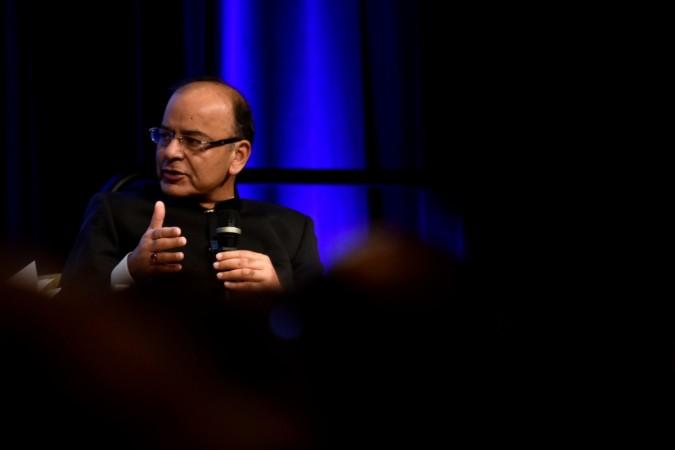
Arun Jaitley, union finance minister, spoke elaborately at the plenary session of the International Monetary and Finance Committee (IMFC) on "IMF Institutional Issues" in Washington last Saturday (Oct. 8).
Expressing concern over weak outlook for global growth due to "uncertainties emanating from both economic and political sources," he said that accomodative monetary policies of advanced economies pose risks to emerging economies.
"We would expect that while the IMF analyzes the implications of low and negative interest rates, it should also analyze the implications of these rates for EMDEs. We look forward to the IMF's work to better understand the drivers of the slowdown in productivity growth," Jaitley said.
While appreciating the IMF's advice to commodity exporters to diversify in the context of falling prices globally, Jaitley said that a weak global economy makes the exercise prolonged and tough.
"...for a country to diversify its economy over the course of a few years is not an easy task, particularly at a time when global demand is subdued.Therefore, we would like the Fund to be more concrete in its advice for diversification, with a set of focused recommendations for action, which are consistent with a country's resources and capabilities," he said.
Here is the full text of his speech:
"Thank you, Mr. Chairman. I also thank the Managing Director for a comprehensive Global Policy Agenda. Mr. Chairman, we broadly agree with the IMF's recent assessment of the global economy. The recovery from the global financial crisis has not been as healthy as we would have liked. Growth remains subdued and the outlook is clouded by uncertainties emanating from both economic and political sources. Against this backdrop, we also broadly agree with the way forward proposed in the Managing Director's Global Policy Agenda. We particularly welcome the focus on measures to make growth more broad based. We support the proposals for identifying policy space. We believe that the IMF represents an unparalleled pool of economic knowledge and experience and has a very important role to play in advising its membership on the way forward. This is particularly true of those members whose capacities of economic policy formulation and implementation are less developed. However, the IMF also needs to continue working on removing perceptions of lack of evenhandedness. The Fund's smaller members should be confident that they are considered as important as the larger ones, and Fund conditionality in programs is not unnecessarily burdensome for them.
Mr. Chairman, monetary policies in advanced economies have stayed accommodative for an unprecedentedly longtime. In today's interconnected world, these policies inevitably produce spillovers to EMDEs. We have consistently maintained that monetary policies in advanced economies should be mindful of the risks caused to EMDEs. We would expect that while the IMF analyzes the implications of low and negative interest rates, it should also analyze the implications of these rates for EMDEs. We look forward to the IMF's work to better understand the drivers of the slowdown in productivity growth. We understand the Fund's advice to commodity exporters for adjustment and diversification. However, for a country to diversify its economy over the course of a few years is not an easy task, particularly at a time when global demand is subdued. Therefore, we would like the Fund to be more concrete in its advice for diversification, with a set of focused recommendations for action, which are consistent with a country's resources and capabilities. Mr. Chairman, with inward looking policies finding support of a significant part of the population in some countries, the Fund's call for and focus on international cooperation are timely. As the Global Policy Agenda mentions, such cooperation should cover diverse areas like trade integration, financial regulatory reform and managing spillovers. Recently, the Fund's work plan has expanded to cover areas where the Fund does not have as much expertise as it has in macroeconomic policies. These include policies to deal with the impact of climate change, foster financial inclusion, tackle growing inequality and so on. The Fund would do well to collaborate with the relevant international organizations as it takes on these work-streams, while also making efforts to enhance its in-house capabilities through training and recruitment Finally, Mr. Chairman, let me say that we are somewhat disappointed that the deadline for completing the 15th Review will be pushed back to the 2019 Spring Meetings. Given that there is broad agreement on maintaining the current overall lending capacity of the Fund and that the Fund's resource pool is excessively tilted toward borrowed resources, there is a dire need for increasing quotas. Recent work by the Fund also points to the need for realigning quota shares to reflect the changed economic realities. All this can be achieved as part of the 15th Review. Delays in General Reviews of Quotas erode the Fund's legitimacy and credibility, and are against the provisions of the Articles of Agreement. I do hope that the deadlines that will now be set for completing the 15th Review, including agreement on a new quota formula as the basis for realignment of quota shares, will be honored and adhered to in letter and spirit. It is also important that the new quota formula should give more weight to PPP GDP to better reflect the true economic strength of EMDEs."

















